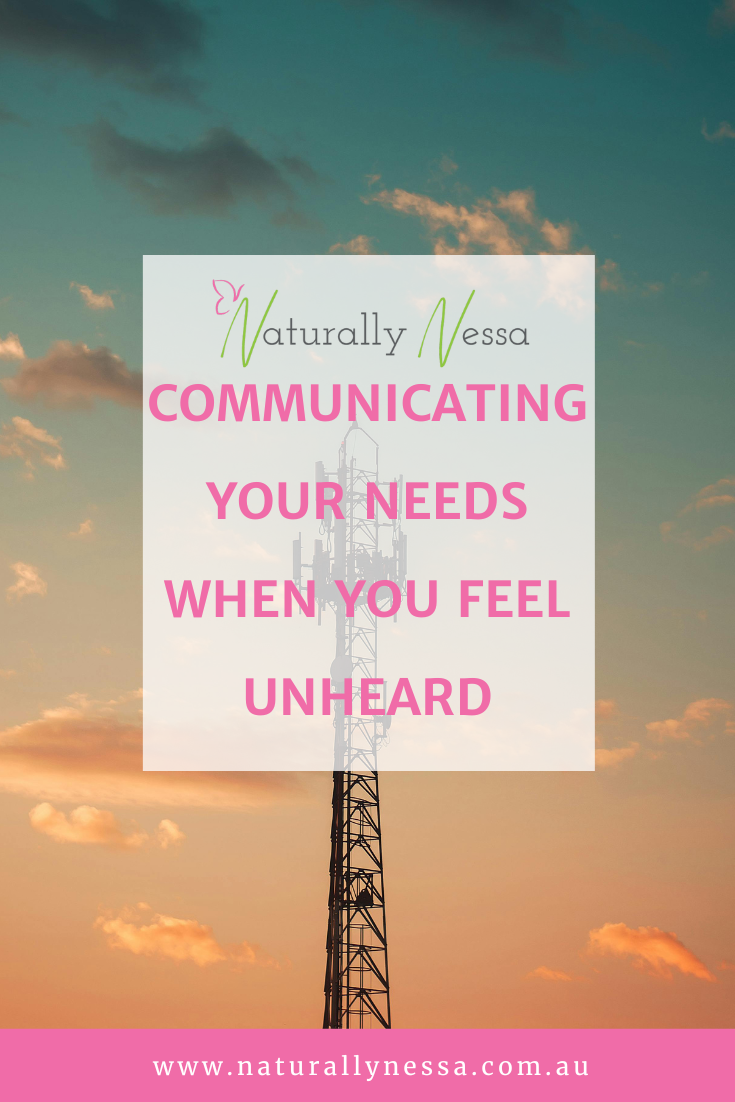Communicating Your Needs When You Feel Unheard
HOW TO TALK TO YOUR PARTNER ABOUT YOUR NEEDS NOT BEING MET
If you’re reading this, then you may be feeling unfulfilled in your relationship right now. You don’t feel that the connection is as strong as it once was. Maybe you’re even feeling a little neglected, or downright emotionally abandoned. This leaves you feeling insignificant, to the person who matters to you more than anyone in the world.
What you need to know is that you matter to your partner, and that they feel your needs are important.
So, how do you tell them how you’ve been feeling, in a way that gets heard and understood?
How do you communicate your feelings, and clarify your needs, in a way that inspires a desire to take actions to create closeness, rather than resentment and distance?
Every satisfied emotional need breeds connection and deepens your bond. Therefore, every unmet need has the opposite effect— it breeds disconnection. This happens because, when your needs aren’t consistently met, it produces distress within you, leading to conflict, which, if not handled skillfully, breeds further disconnection.
Before speaking to your partner, it’s important to understand for yourself how and why you are feeling neglected or deprived, so you have the clarity you need to articulate what you believe is causing your angst, and what needs to happen for connection and closeness to be fully restored in your relationship.
Have you considered why, from your end, your needs haven’t been fully met?
Have you been clear about what you need?
Have you been meeting your own needs?
Have you been fully meeting your partner’s needs?
Have you shamed or criticized your partner for not meeting your needs?
Have you expected too much of your partner?
Do you have expectations that your partner never actually agreed to?
These are a few of the questions you should be asking yourself before you start a conversation with your partner.
PREPARE FOR THE CONVERSATION
Before sitting down with your significant other to talk about your needs, there are 2 inner reflections I recommend doing with yourself first.
1. Identify any stories you’ve been telling yourself about why your needs are not being satisfied
Stories like, “They don’t want to give me what I need,” “I’m with the wrong person because the right person wouldn’t be this neglectful towards me,” and “They don’t care about me.”
It’s critical that, before you speak to your partner, you suspend any assumptions or conclusions that put you at odds with them. You need to approach them by giving them the benefit of the doubt. This is what it means to be a team, even when you’re feeling distant.
2. Have a conversation with yourself about what it is you actually need
Ask yourself, “What do I need, and how do I want my needs to be fulfilled?”
For instance, you may need and enjoy a lot of physical affection and touch. And what you want is to hold hands more often, snuggle during movie time, and/or to enjoy a nice passionate kiss each morning before you go your separate ways.
Being able to distinguish between the fundamental need at the core (affection), and the behaviours and actions that fulfill it, is key.
So, what do you need and what do you desire?
Almost everyone will have some need for affection, but not everyone will want that need met in the exact same way. This is the case with all of our basic emotional needs, be it affection, appreciation, respect, safety, validation, devotion, or trust.
Therefore, it’s important to know what behaviours specifically fulfill a particular need for you.
It’s essential to be mindful about the energy and attitude you bring to the conversation.
Body language is the primary communicator.
Our words have little power in comparison to our posture, tone, facial expressions, and vibes. That is why you need to approach your partner with a loving spirit, knowing that they love you, that they want to satisfy you in every way, and that they are deserving of your love and kindness, even when you’re upset with them.
KNOW WHAT NOT TO DO
The three most crucial things to avoid are blame, shame, and criticism. If you do these things, you have one guarantee— your partner will not leave the conversation inspired to love you more intentionally. Why would they? You are not meeting their fundamental needs when you blame, shame, and criticize.
What is likely to happen, is that you end up gridlocked, neither of you willing to show love and affection generously until the other does. This is where the age old idea that two wrongs don’t make a right can be a helpful reminder.
And, again, do not assume the worst about your partner. I see it all the time— one partner is angry and frustrated because they aren’t being loved the way they want to be. So they unintentionally begin withholding love from their partner, punishing them away with silence, distance, and sometimes even rudeness.
To move from self-centeredness to self-awareness, we need to know what we want and need. When we are unaware of what we need, we still try to get those wants and needs met – we just do it in more hurtful ways: complaint, criticism, manipulation, etc.
So, approach the situation in a conscious way.
What I suggest doing when you are feeling upset and angry, is first own your emotions and realise that they stem from your interpretation of the situation.
Your fears and deep-seated beliefs about your own sense of inadequacy, unworthiness, or unlovability often lie at the root of all those negative stories you tell yourself about why life is happening the way that it is. Especially in relationships.
Take a moment to challenge your assumptions, and allow the possibility that something completely different could be true.
You are loved! And with patience and respectful communication, you can experience something exceptional with the person you love.
See this as an opportunity to vulnerably share something about yourself with your partner, so that they can understand you better and be curious, so that you, through this experience, can learn something about them, too.
Learning about each other is how we become better at loving one another. This requires compassion, an open mind, and a commitment to mutual listening and understanding.
HOW TO TALK TO YOUR PARTNER ABOUT YOUR NEEDS
Now that you’ve set the foundation regarding perspective, energy, and intention, we can move on to what to actually say to your partner about your unmet needs. The goal is that you speak from your heart, and express your truth with love and gentleness.
Pick an appropriate TIME
Let your partner know you have something on your mind and want to discuss it with them. Ask if this is a good time. If it isn’t, decide together when a good time would be.
Find something to PRAISE
Begin the conversation by sharing something you are happy about - it could be something small that they did or said recently, or a way in which they have generally been showing up and how it makes you feel. Let them know that you see what they are doing right, and that you are aware of the positives in them and the relationship.
It could be something as simple as, “First, I want to say that the other day when you *fill in something kind, thoughtful, sexy, fun that they did or said*, I really liked that. It made my day.”
*Important note: If your partner is feeling anxious about the conversation, and is showing or expressing that they just want to know what’s going on, skip this step. In this situation, it’s better to just get right to it to ease the distress your partner is feeling, being in the dark. You can offer up praise at the end if it feels right and not forced.
Focus on HOW YOU FEEL first
I feel… disconnected/distant/lonely/sad/rejected/worried/frustrated
Then state WHY
Because we haven’t…
Had a date night/gone on an adventure/spent a whole day together/had sex/just laid around and goofed off together/shown each other much affection/shared the household responsibilities equally/been checking in with each other like we used to...
Clarify your NEED
It’s really important to me that we *blank* because that is what I need to feel…
Connected to you/safe in the relationship/confident that we are in a good place/appreciated by you/loved by you/important to you/close to you
Make a REQUEST or INVITE them to solve the problem with you
Would you be willing to *state specific behaviour*? Or…
Can we talk about what it will look like for us to *blank*?
From here, you can get into the conversation. This is where you discuss what works for both of you, regarding both your needs and how they should get met. Remember that, while the need/desire is non-negotiable, the way you want the need met may need to be negotiated.
THANK them for listening
Let them know how much it means to you that you’ve been able to share and feel heard. Mention anything specific that they did or said that you really appreciated.
ASK them if there is anything more they’d like to talk about with you
Is there anything else you’d like to say? I’m listening.
How does it feel to imagine having a conversation like this with your partner?
What stands out to you?
By laying down a solid foundation through open communication, it’s much easier to address and rectify things whenever there is a breakdown or a disconnect in the future.
Upon saying that, many of us are still disconnected from our own needs and end up struggling to identify what we really need, what we want, and how to communicate that within relationships. That’s okay. If this is you, it’s not too late to find the joy and satisfaction you long for in your relationship.
As long as you can: own that you are in the process of discovering new things about yourself, regarding your needs; lovingly clue your partner in to what you are learning; and invite them to show you love in the ways you desire, rather than demanding it, things can work out beautifully.
If you are unsatisfied in your relationship, the change needs to start with you.
The intention is to end all the confusion, frustration, and disappointment you feel, and replace it with intimacy, passion, and connection.
You’re not powerless and you can create the loving dynamic relationship that you have been missing or longing for.
PIN FOR LATER:


